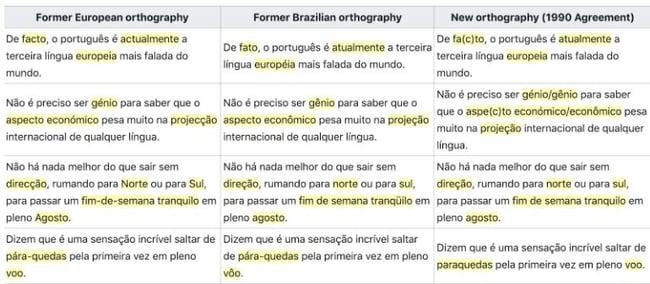Drafted during the 1980s, signed in December 1990, the Portuguese Language Orthographic Agreement was regarded as the first firm step to unify the Portuguese, currently spoken by over 270 million people. Through a process with advances and setbacks, the reformed Portuguese orthography became mandatory in three of the nine Lusophone Commonwealth countries. Meanwhile, Angola has not yet signed the agreement.
The Portuguese Language Orthographic Agreement
The Portuguese Language Orthographic Agreement of 1990 is an international treaty whose purpose is to create a unified orthography for the Portuguese language, to be used by all the countries that have Portuguese as their official language. It was signed in Lisbon, on 16 December 1990 and the signatories included official representatives from all of the Portuguese-language countries except East Timor, which was under Indonesian occupation at the time, but later adhered to the Agreement, in 2004.
The Agreement of 1990 intends to establish a single official orthography for the Portuguese language and thus to improve its international status, putting an end to the existence of two official orthographic norms: one in Brazil and another in the remaining Portuguese-speaking countries. Proposers of the Agreement give the Spanish language as a motivating example: Spanish has many variations, between Spain and Hispanic America, both in pronunciation and in vocabulary, but it is under the same spelling norm.
The adoption of the new orthography cause changes in the spelling of about 1.6% of the words in the European norm and about 0.5% in the Brazilian norm.
The transition period in Portugal ended on the 12th of May 2015. As of January 2016, transitions have also ended in Cape Verde and Brazil, making the reformed Portuguese orthography mandatory in three of the nine lusophone countries.

Portuguese is the official language in six African states
Portuguese is spoken in a number of African countries and is the official language in six African states: Angola, Mozambique, Guinea-Bissau, Cape Verde, São Tomé and Príncipe and Equatorial Guinea. There are Portuguese-speaking communities in most countries of Southern Africa, a mixture of Portuguese settlers and Angolans and Mozambicans who left their countries during the civil wars. A rough estimate has it that there are about 14 million people who use Portuguese as their sole mother tongue across Africa, but depending on the criteria applied, the number might be considerably higher, since many Africans speak Portuguese as a second language, in countries like Angola and Mozambique, where Portuguese is an official language, but also in countries like South Africa and Senegal, thanks to migrants coming from Portuguese speaking countries. Some statistics claim that there are over 30 million Portuguese speakers in the continent.
Some statistics claim that there are over 30 million Portuguese speakers in Africa
In Angola, who hasn't signed the agreement yet, there are different stages of Portuguese language in a similar manner to other Portuguese-speaking African countries.
Angolan Portuguese is a group of dialects and accents of the Portuguese language used mostly in Angola, where it is an official language. In 2005 it was used there by 60% of the population, including by 20% as their first language. The 2016 CIA World Fact Book reports that 12.3 million, or 47% of the population, speaks Portuguese as their first language. However, many parents raise their children to speak only Portuguese. The 2014 census found that 71% speak Portuguese at home, many of them alongside a Bantu language, breaking down to 85% in urban areas and 49% in rural areas.
The 2014 census found that 71% speak Portuguese at home, many of them alongside a Bantu language
Like French and English, Portuguese has become a post-colonial language in Africa and one of the working languages of the African Union (AU) and the Southern African Development Community (SADC). Portuguese co-exists in Guinea-Bissau, Cape Verde, and São Tomé and Principe with Portuguese-based creoles (Upper Guinea and Gulf of Guinea Creoles), and in Angola, Mozambique, and Guinea-Bissau with autochthonous African languages (mainly Niger–Congo family languages).
Lusophone Commonwealth: where Portuguese is an official language
The Community of Portuguese Language Countries (Portuguese: Comunidade dos Países de Língua Portuguesa; abbreviated as the CPLP), also known as the Lusophone Commonwealth is an international organization and political association of Lusophone nations across four continents, where Portuguese is an official language. The CPLP operates as a privileged, multilateral forum for the mutual cooperation of the governments, economies, non-governmental organizations, and peoples of the Lusofonia. The CPLP consists of 9 member states and 19 associate observers, located in Europe, the Americas, Asia, and Africa.
Through successive enlargements, the Union has grown from the seven founding states - Angola, Brazil, Cape Verde, Guinea-Bissau, Mozambique, Portugal, and São Tomé and Príncipe - to the current nine, with the self-determination of Timor-Leste in 2002 and the accession of Equatorial Guinea in 2014.
The CPLP consists of 9 member states and 19 associate observers, located in Europe, the Americas, Asia, and Africa.
The community has grown beyond its mission in fostering cultural ties between the Portuguese language countries into facilitating trade and political cooperation between the Lusophone countries of the world. Its citizens totalling more than 270 million people. In 2017 the nine member states agreed to enlarge cooperation in matters of the seas, tourism, economy and a more ambitious defense and cooperation mechanisms.
This text was not written by a native English speaker, but by a language lover. However, all our language services are always provided by native speakers.
Sources:
ABOUT US
AP PORTUGAL Tech Language Solutions is the expression of service and vision in the areas of translation, interpretation and communication technology services.
With offices in Lisbon and Porto, it is the only Portuguese company certified by both International Quality Standards ISO 17100 and ISO 18587, and also by DGERT as a training entity. Internationally renowned for its skills in the areas of translation, interpretation, transcription, localization, subtitling and proofreading, the company is also specialized in event and conference management, audiovisual equipment rental, and VRI - Video Remote Interpreting.
The company’s intervention extends to the area of creative content production in any language, allowing AP | PORTUGAL to support companies and organizations through its Copywriting platform, also focusing on text, audio or video solutions based on Artificial Intelligence.
AP PORTUGAL includes the Artiga Center - European Centre for Amplified Events -, a facility which offers all equipment necessary for any type of event, be it hybrid, face-to-face or digital, besides being equipped for face-to-face or digital Team Building activities.
You can also follow us on social media: Facebook, LinkedIn, Twitter and Instagram.
Related Articles:
A study by the British Council about the UK's linguistic priorities, entitled "Languages...
Related Articles:
We all learn from good and bad examples, that's pretty much a fact and, the same...
Related Articles:
Whenever your company or organisation introduces a brand, product or content in another...






Comments